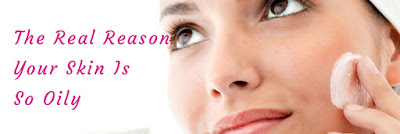If you have oily
skin, then it’s probably your parents that you can thank for that,
because oily skin is something that is passed down in the genes. As
anyone with oily skin will know, it can be really difficult to deal
with. Not only do you have the constant worry that a shine has
appeared on your face, excess oil on the skin can also cause
blackheads, pimples and other skin irritations.
Oily skin is not all
bad news through, for a start you will probably age better, because
the excess oil helps to prevent wrinkles from forming. The other bit
of good news we have for you is that oily skin can be dealt with and
there are ways to make sure that your face looks great all day long.
If you feel like you are fighting a losing battle against your oily
skin, then read on, and you will find ten great tips on how to deal
with oily skin.
What
is an Oily Skin?
When it appears that
your entire skin (especially on the face) is coated with layers and
layers of oil, you are probably suffering from an oily skin. The
overproduction of oil is caused by hyperactive sebaceous glands.
What
Causes Oily Skin?
Our body produces
oil to help keep our skin
soft and supple, but if too much sebum is produced, it can lead to
acne flare-ups and oiliness which are some of the leading causes of
acne. Two main factors are to blame: hormones and genetics.
Oily skin is known
medically as seborrhea and is caused by excess skin oil produced
within the pores. During puberty and other life events, fluctuating
hormones can result in increased androgen levels. Androgens are male
hormones present in both males and females that signal the maturation
of the skin’s sebaceous glands. As these glands mature, oil
production increases.
The higher amount of
androgens present, the more sebum is funneled through the pores,
which then sits on the surface of the skin, creating an oily sheen.
Should this excess oil become trapped in the pore and combine with
dead skin cells and bacteria on the surface of the skin and inside
the pore, pimples, blackheads, and other blemishes will form.
It’s also
important to note the role that genetics can play in oily skin. In
most acne patients, the reaction to hormonal changes is dependent on
genes and hormones. Life events like puberty or pregnancy can result
in hormone fluctuations, and genetics and hereditary factors can
determine how your skin reacts to these hormone fluctuations.

Lifestyle
Habits that May Affect Oily Skin
There are many ways
that daily habits and lifestyle choices can affect your skin, and
impact the appearance of oil.
1. Get Enough
Sleep
Getting the
right amount of rest each night is important to holistic health, and
it also can significantly affect the look and appearance of the
skin. Sleep deprivation can result in insulin resistance. Insulin
increases can result in the creation of IGF-1, a hormone that
stimulates an increase in the production of sebum.
2. Keep Your
Stress in Check
Be sure to
manage your stress, as it has been connected to insulin resistance
and worsened breakouts in numerous studies. Exercise regularly,
practice meditation, and talk to a friend or family member if you’re
feeling overwhelmed.
3. Always Wear
Sunscreen
No matter your
skin type, it’s important to use daily SPF to keep your skin safe
and looking its best. However, with oily skin, it’s important to
take a look at the type of sunscreen you’re using to avoid blocking
up those pores. Look for sunscreen gels that are labeled oil-free.
If you wear
makeup, look for light foundation products that contain SPF for an
added bit of protection.
4. Makeup
Practices
Makeup doesn’t
cause acne, but with misuse can become a problem. Look for
non-comedogenic makeup products, and always apply in light layers.
Always be sure to remove every last bit of makeup before going to bed
and before working out or heading to the gym.
if you are looking
for good and top Beauty Parlour
Services at Doorstep Bangalore,
Contact Glam
Services
Nice Post..!! Get the healthy and glowing skin at Best Spa in Hyderabad
ReplyDeletespa in Hyderabad female to male
massage services in hyderabad
Massage in Hyderabad
This article is extremely useful and intersting,Thanks for sharing such an instructive article with us.keep updating. Best Beauty Salon in Mohali, Best Bridal Makeup in Mohali, Best Salon Packages in Mohali
ReplyDeleteNice post thanks for Share information. Best Beauty Salon in Mohali, Best Bridal Makeup in Mohali, Best Salon Packages in Mohali
ReplyDelete